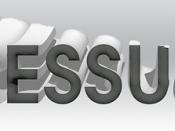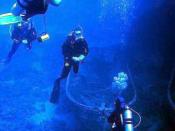Decompression sickness
S.C.U.B.A stands for self-contained underwater breathing apparatus. When using SCUBA equipment, a diver breathes from a tank that holds compressed air.
S.C.U.B.A diving is different from holding your breath and diving. When we are living on dry land, the air around us has a pressure of 14.7 pounds per square inch. That is a "normal pressure" for our bodies. Because water is so heavy compared to air, it does not take much water to contain a lot of pressure.
If you hold your breath and dive down 33 feet, your lungs contract in size by a factor of two. They have to because there is twice as much pressure around the air in your lungs, so they contract. When you rise back up the air expands again, so your lungs return to normal size. When you breathe from a S.C.U.B.A tank, the air coming out of the tank actually has the same pressure as the pressure that the water has at whatever depth you are at.
It has to, or it won't come out of the tank.
If a SCUBA diver stays under water, say at a depth of 100 feet, for a certain period of time, some amount of nitrogen from the air will dissolve in the water in his or her body. If the diver were to swim quickly to the surface, it is just like opening a can of pop that has been shaken, the gas is released. This can cause a very painful condition, and it is sometimes fatal. Divers can determine how long it should take them to surface by two factors, their time they have spent down underwater and by their depth, but in many cases, it is just carelessness. If the diver does rise too fast, the only cure is...


